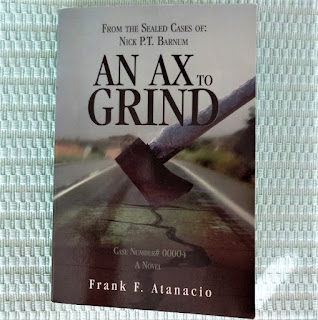In this fantasy fiction Novel by Frank Atanacio, Nick P.T. Barnum, a crime solving private detective works his magic to solve a case about murder, revenge and copy-cat killers.
This story features courtroom drama and reveals loopholes that criminals use to exploit the system with the aid of legal counsel.
No one likes it when a crook is set free because of a legal technicality, except for the criminal.
"Even the best, most respected lawyers will defend someone as sick and twisted as Willie the Greek for the right price."
The author expertly sets a scene where drug dealers are waiting to secure their supply source when a dispute breaks out and a stray bullet hits an unintended victim. The aftermath of that unintentional murder is the basis for this murder mystery featuring the quirky and likable detective, Nick P.T. Barnum.
For those unfamiliar with the idiom, "An Ax to Grind," the UK definition suggests that it refers to a person that holds a grudge or a beef against someone with a private end to serve. The phrase likely comes from the act of sharpening an ax with the intention of using it to take revenge. Quora defines it as "To have a grievance with someone, especially where one feels the need to seek damaging retribution."
Revenge is the motive for a string of murders perpetrated by the primary suspect, Gary Manda, in the case after his young child is slain. Gary is the son of virtuous, well-respected, and God fearing matriarch, Mable Manda, who is torn between her desire for retribution of her grandchild's murder and her strong Biblical beliefs.
Private detective, Nick Barnum, walks a thin line between sympathy for his friend, Mable's loss, and the compelling desire to hunt down and find a serial murderer.
Atanacio is well equipped to serve up portions of suspense, humor, camaraderie, justice and reality in this fast-paced fiction story where many of the characters are familiar from his previous novels. Between Willie the Greek and his Bridgeport Police Department companions, the author spins a web of intrigue and mystery that puts P.T. Barnum to task in solving the case. The detective's sense of humor and self deprecatory nature is endearing often revealed in his "boy bashing" meals shared with other agents of the law.
The author mixes playful, flirtatious banter into the interactions between police officers, office staff, and restaurant servers inviting the reader into the scene with the natural flow of colorful characters.
Set in Bridgeport, Connecticut, the story takes the reader on an adventure that incorporates elements of the legal system, the criminal mind, a hint of romance for a not-so-perfect aging detective and realistic portrayals of characters in their station of life.
Barnum's office assistant is a sassy, young, adept and impressionable character whose full story is not revealed, leaving the reader to form certain conclusions as to her true nature and desires. She holds her own against the detective who can dish it out as well as take it on the chin. Their playful banter and casual working relationship is an enjoyable sideline to the story.
Frank's use of the common vernacular of the different characters is authentic and believable, leading the reader to assume the author knows these characters in person. He doesn't shy away from uncomfortable or politically incorrect slang that makes the dialogue flow smoothly as if spoken on the street.
He can effectively capture the stirrings of young love and the angst of a young man who has feelings for his first crush. The author's mastery of the characters brings them to life allowing the reader to empathize or despise as necessary based on their actions.
As the pivotal scene occurs in the playground, the narrative inches the story into the next dimension between life and death.
"He knew something was happening, but he could not tell what it was. The commotion was simply not registering in his head. . .Suddenly, he saw a bright light pass before him. It was almost blinding as he tried to adjust his eyes to it."
From that moment, everything in the story takes a new turn.
For readers hooked on murder mysteries like Lee Child's Jack Reacher series, Live PD, Snapped, The Homicide Hunter, Dateline, First 48, I Almost Got Away With It, and other reality TV drama, this story was a compelling and enjoyable read written by one of the best.
.jpg)












